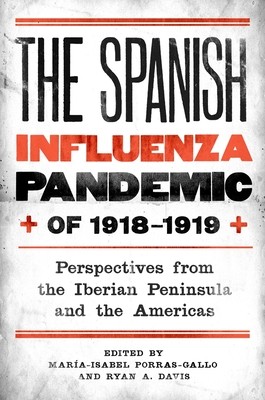
- We will send in 10–14 business days.
- Publisher: University of Rochester Press
- Year: 2014
- Pages: 290
- ISBN-10: 1580464963
- ISBN-13: 9781580464963
- Format: 15.2 x 22.9 x 2.1 cm, kieti viršeliai
- Language: English
- SAVE -10% with code: EXTRA
The Spanish Influenza Pandemic of 1918-1919 (e-book) (used book) | bookbook.eu
Reviews
Description
Sheds new light on what the WHO described as "the single most devastating infectious disease outbreak ever recorded," focusing on social control, gender, class, religion, national identity, and military medicine's reactions to thepandemic.
Situating the Iberian Peninsula as the key point of connection between Europe and the Americas, both epidemiologically and discursively, The Spanish Influenza Pandemic of 1918-1919 sheds new light on what the World Health Organization described as "the single most devastating infectious disease outbreak ever recorded." The essays in this volume elucidate specific aspects of the pandemic that have received minimal attention until now, including social control, gender, class, religion, national identity, and military medicine's reactions to the pandemic and relationship with civilian medicine. While World War I, as the authors point out, is the context for these discussions, the experiences of 1918-19 remain persistently relevant to contemporary life, particularly in view of events such as the 2009 H1N1 swine flu pandemic and the Ebola outbreak of 2014. Contributors: Catherine Belling, JosepBernabeu-Mestre, Liane Maria Bertucci, Ryan A. Davis, Esteban Domingo, Magda Fahrni, Hernán Feldman, Pilar León-Sanz, Maria LuÃsa Lima, Maria de Fátima Nunes, Mercedes Pascual Artiaga, MarÃa-Isabel Porras-Gallo, Anny Jackeline Torres Silveira, José Manuel Sobral, Paulo Silveira e Sousa, Christiane Maria Cruz de Souza. MarÃa-Isabel Porras-Gallo is professor of history of science in the Medical Faculty of Ciudad Real at the University of Castilla-La Mancha (Spain).Ryan A. Davis is assistant professor in the Department of Languages, Literatures, and Cultures at Illinois State University.
EXTRA 10 % discount with code: EXTRA
The promotion ends in 21d.19:09:25
The discount code is valid when purchasing from 10 €. Discounts do not stack.
- Publisher: University of Rochester Press
- Year: 2014
- Pages: 290
- ISBN-10: 1580464963
- ISBN-13: 9781580464963
- Format: 15.2 x 22.9 x 2.1 cm, kieti viršeliai
- Language: English English
Sheds new light on what the WHO described as "the single most devastating infectious disease outbreak ever recorded," focusing on social control, gender, class, religion, national identity, and military medicine's reactions to thepandemic.
Situating the Iberian Peninsula as the key point of connection between Europe and the Americas, both epidemiologically and discursively, The Spanish Influenza Pandemic of 1918-1919 sheds new light on what the World Health Organization described as "the single most devastating infectious disease outbreak ever recorded." The essays in this volume elucidate specific aspects of the pandemic that have received minimal attention until now, including social control, gender, class, religion, national identity, and military medicine's reactions to the pandemic and relationship with civilian medicine. While World War I, as the authors point out, is the context for these discussions, the experiences of 1918-19 remain persistently relevant to contemporary life, particularly in view of events such as the 2009 H1N1 swine flu pandemic and the Ebola outbreak of 2014. Contributors: Catherine Belling, JosepBernabeu-Mestre, Liane Maria Bertucci, Ryan A. Davis, Esteban Domingo, Magda Fahrni, Hernán Feldman, Pilar León-Sanz, Maria LuÃsa Lima, Maria de Fátima Nunes, Mercedes Pascual Artiaga, MarÃa-Isabel Porras-Gallo, Anny Jackeline Torres Silveira, José Manuel Sobral, Paulo Silveira e Sousa, Christiane Maria Cruz de Souza. MarÃa-Isabel Porras-Gallo is professor of history of science in the Medical Faculty of Ciudad Real at the University of Castilla-La Mancha (Spain).Ryan A. Davis is assistant professor in the Department of Languages, Literatures, and Cultures at Illinois State University.


Reviews